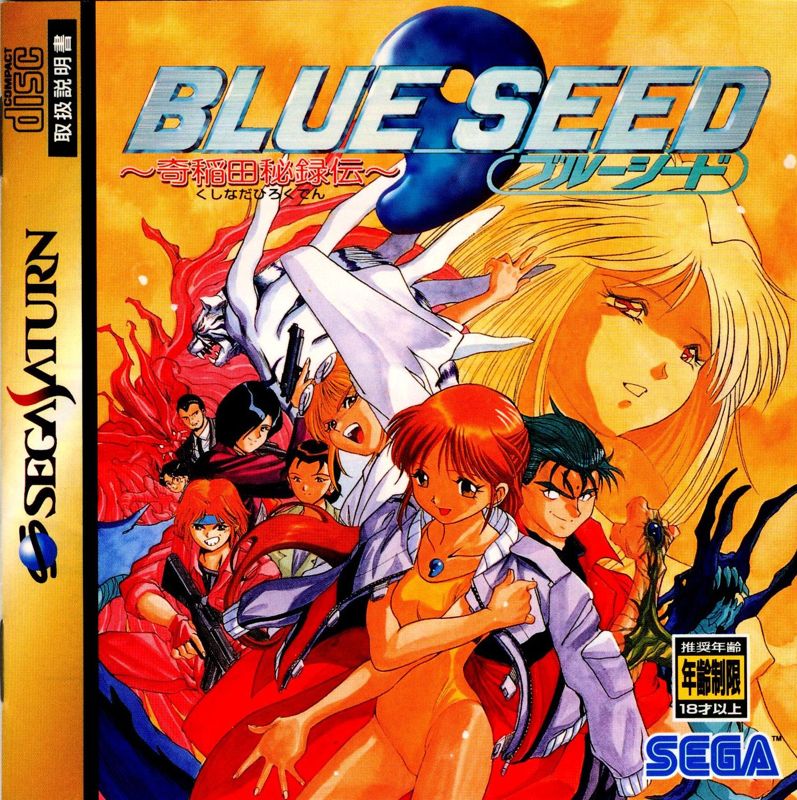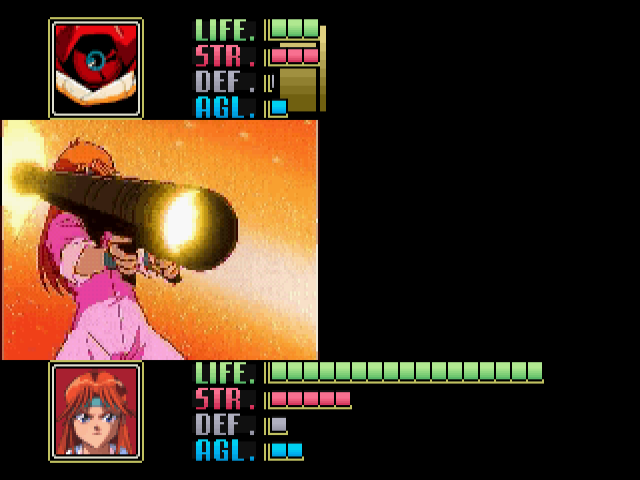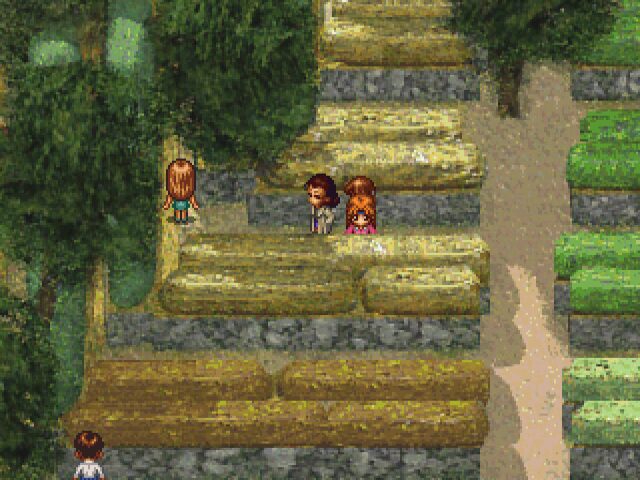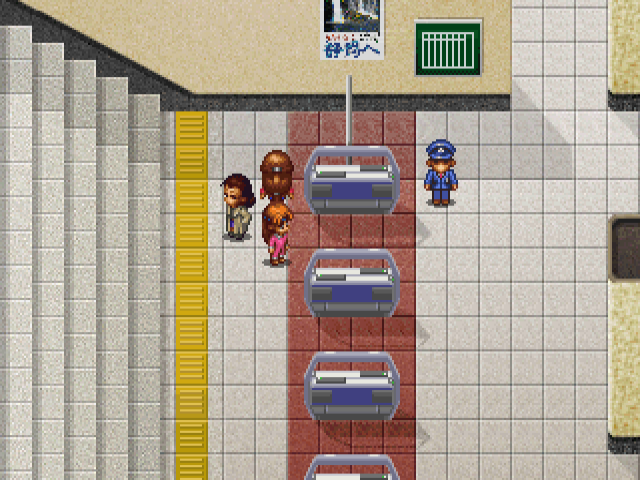Retro Replay Review
Gameplay
Blue Seed: Kushinada Hirokuden offers a mission-based structure that keeps each play session focused and purposeful. You take on assignments from Daitetsu Kunikida, the head of a covert government organization, and deploy Momiji Fujimiya alongside a rotating cast of agents to investigate and neutralize Aragami threats. Rather than wandering aimlessly, you learn to read mission briefs, scout locations, question NPCs, and follow subtle clues—an approach that blends investigative strategy with classic RPG tropes.
(HEY YOU!! We hope you enjoy! We try not to run ads. So basically, this is a very expensive hobby running this site. Please consider joining us for updates, forums, and more. Network w/ us to make some cash or friends while retro gaming, and you can win some free retro games for posting. Okay, carry on 👍)
The core of combat lies in its innovative card-based system. Every character’s agility stat dictates how many cards they can play in a turn, requiring you to balance offense, defense, and support actions. Without random encounters or traditional leveling, victory hinges on learning enemy patterns, choosing the right cards, and timing your special moves. This keeps battles tense and rewarding: outsmarting a powerful Aragami feels like a genuine achievement rather than the result of grinding.
Outside of combat, party management and puzzle-solving shine. Each agent brings unique skills—one might clear rubble with dynamite, another can sense hidden energy traces—pushing you to rotate your squad based on mission demands. Inventory and resource management also play a subtle role, as equipping items that boost agility or enhance card decks can turn the tide in difficult skirmishes.
Pacing strikes a careful balance between exploration and action. Since there are only a handful of major battles per mission, much of your time is spent uncovering hidden passages, investigating village ruins, or deciphering ancient runes. Fans of methodical, story-driven RPGs will appreciate how this design emphasizes decision-making over button-mashing.
Graphics
Graphically, Blue Seed: Kushinada Hirokuden captures the mood of both mythic Japan and modern mystery. Character portraits are rendered in sharp anime style, complete with expressive eyes and fluid lip-sync during dialogue. Cutscenes are hand-drawn, giving emotional weight to key story moments when Momiji’s ancestral powers awaken or when Aragami emerge from the Blue Seed energy wells.
The overworld and dungeon environments blend traditional Japanese architecture with supernatural elements. Shinto shrines, bamboo forests, and moonlit mountain passes present a serene backdrop, slowly overlaid with twisted flora and pulsating crystals. Lighting effects are minimal by today’s standards but effectively convey the eerie atmosphere of a land haunted by ancient terrors.
Battle animations emphasize the card mechanics: each time a character unleashes a special technique, the battlefield flashes with dynamic lines and color shifts that underscore the move’s elemental power. Enemy designs strike a good balance between grotesque and beautifully intricate, ensuring Aragami feel otherworldly rather than generic.
While the game doesn’t push for photorealism, its consistent art direction and attention to detail in character costumes and background textures make exploration genuinely engaging. Small touches—like wind-blown lanterns or drifting petals—add to the immersion and keep the world feeling alive.
Story
At its heart, Blue Seed: Kushinada Hirokuden weaves ancient myth and modern reality into a tale of destiny and duty. You begin with a prologue set at the dawn of Japanese legendary history, where the princess Kushinada first banishes the Aragami. Fast forward to the present, and those same monsters return, feeding on Blue Seed energy to sow chaos across the archipelago.
Momiji Fujimiya is your lens into this supernatural struggle. A seemingly ordinary teenager, she soon learns she harbors the spirit of princess Kushinada. The narrative explores her transformation from reluctant civilian to determined agent, wrestling with the responsibility of wielding divine power. Along the way, Momiji’s interactions with teammates—each with their own backstories and motives—add richness to the party dynamic.
Dialogue is generally well-paced, with moments of levity offsetting the darker implications of demonic invasions. Conversations with local villagers and shrine priests deepen the lore, while mid-mission updates from Daitetsu keep the sense of urgency high. Although some exposition-heavy scenes can slow momentum, they’re often rewarded by revealing hidden Blue Seed conspiracies or unlocking new puzzle areas.
The story culminates in a multilayered showdown that ties personal growth, ancient prophecy, and high-stakes action together. Even after the credits roll, hints of lingering Aragami threats and unanswered questions suggest potential for further adventures, making it a satisfying yet open-ended conclusion.
Overall Experience
Blue Seed: Kushinada Hirokuden stands out for its fusion of strategic card-based combat, exploratory mission design, and myth-inspired narrative. It doesn’t cater to players seeking nonstop battles or endless grinding; instead, it delivers a measured, story-centric journey that rewards careful planning and curiosity. For those who appreciate deliberate pacing and lore-rich settings, it offers a deeply engaging experience.
The lack of levels and random encounters may feel unconventional to JRPG veterans, but this design choice elevates each encounter, turning every boss fight into a memorable challenge rather than another stat check. Puzzle elements and special abilities ensure environmental interaction never grows stale, keeping your party rotations and item choices meaningful throughout the adventure.
Visually and aurally, the game creates a compelling blend of ancient mysticism and modern urgency. While the graphics won’t compete with blockbuster budgets, the art direction, character animations, and atmospheric soundscapes work in concert to draw you into its supernatural world. Fans of anime-style storytelling will find the presentation particularly appealing.
In summary, if you’re in search of a role-playing game that emphasizes narrative depth, tactical combat, and exploratory intrigue over traditional leveling, Blue Seed: Kushinada Hirokuden is well worth your time. It delivers a fresh take on mythology-driven RPGs and leaves you eager to uncover every secret hidden within Japan’s mysterious Blue Seed legacy.
 Retro Replay Retro Replay gaming reviews, news, emulation, geek stuff and more!
Retro Replay Retro Replay gaming reviews, news, emulation, geek stuff and more!









Reviews
There are no reviews yet.